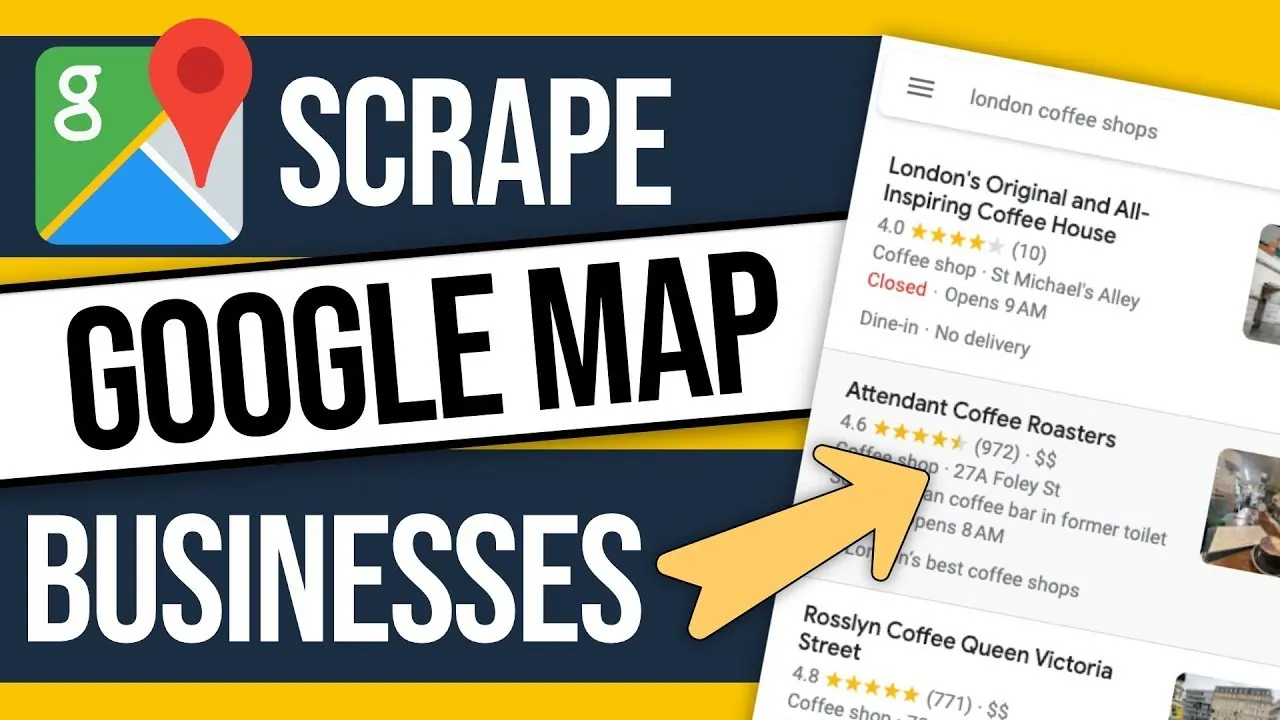
Discover Untapped Local Niches with Google Map Data Scraper
Google Map Data Scraper to Discover Untapped Local Niches
Estimated reading time: 5 minutes
- Leverage Google Map data scrapers to identify untapped local niches.
- Understand the applications across various industries like real estate, food & beverage, home services, and e-commerce.
- Utilize comprehensive data collection for informed decision-making and enhanced local SEO.
- Address challenges in data scraping while maximizing lead generation efforts.
- Seek expert guidance for successful data scraping strategies.
Table of Contents
- Understanding the Google Map Data Scraper
- The Importance of Discovering Untapped Local Niches
- Exploring Industry Applications of Google Map Scraping
- The Advantages of Using a Google Map Data Scraper
- Addressing Challenges in Data Scraping
- Actionable Takeaways for Enhancing Your Data Scraping Efforts
- Conclusion
Understanding the Google Map Data Scraper
The Google Map Data Scraper is an innovative tool designed to extract vital information directly from Google Maps. This includes business names, addresses, phone numbers, and additional details that can aid businesses in their marketing efforts. As companies strive to connect with potential customers in their vicinity, the Google Map Lead Scraper emerges as a game-changer.
Understanding how to leverage tools like a phone number scraper effectively allows businesses to reach out to local leads more efficiently. Moreover, this capability is crucial for businesses targeting hyper-localized marketing, as it helps them understand their potential customer base better.
The Importance of Discovering Untapped Local Niches
In the competitive business environment, tapping into localized markets is critical. Many industries are saturated with competitors, making it challenging for new players to carve out their slices of the pie. However, there are always untapped niches waiting to be discovered.
By employing Google Map data scrapers, businesses can gather actionable intelligence about businesses or services that may be underserved or overlooked in their locality. For instance, a local gym might find that there’s a significant demand for personal training services that the current centers are not offering. Through targeted outreach, they can promote this service and establish themselves as the go-to option for personal training.
Exploring Industry Applications of Google Map Scraping
1. Real Estate
The real estate sector is an excellent example of how a Google Map data scraper can be utilized to discover untapped local niches. Real estate agents can extract data about available properties, local amenities, and even potential clients looking to buy or rent. Scraping Google Maps for data helps agents identify emerging neighborhoods with high growth potential, allowing them to advise clients based on comprehensive market analyses.
2. Food & Beverage
Restaurants and food delivery services can significantly benefit from heat mapping tools that work in conjunction with data extractors. By analyzing local dining habits and extracting business data through a Google Map data scraper, establishments can recognize gaps in the market. For example, if a particular area lacks vegan dining options but has a growing vegan community, a savvy entrepreneur can capitalize on that by opening a new restaurant tailored to this demand.
3. Home Services
Home repair and maintenance services are often localized, making them prime candidates for Google Map scraping. By identifying local service providers and their specialties, businesses can find gaps where their services would be in high demand. For example, if there are fewer available HVAC specialists in a specific area during peak seasons, new businesses can seize that opportunity to fill the void and capture market share rapidly.
4. E-commerce
As the e-commerce sector becomes increasingly competitive, online retailers must find ways to stand out. Google Map data scrapers can help businesses discover potential physical locations for new warehouses or stores, enabling them to cater to customer needs more efficiently. Additionally, a phone number scraper can provide direct lines for local partnerships that can enhance product offerings or delivery services.
The Advantages of Using a Google Map Data Scraper
- Comprehensive Data Collection: Google Map data scrapers collect vast amounts of data, including business names, contact details, hours of operation, and customer reviews. This wealth of information can inform marketing strategies and help businesses understand their competitive landscape.
- Time Efficiency: Manually gathering data can be a time-consuming task. A Google Map Lead Scraper automates this process, allowing employees to focus on strategizing and implementing marketing campaigns rather than getting bogged down in data collection.
- Informed Decision-Making: With rich local insights, businesses can make data-driven decisions that can lead to smarter investments and product offerings, ultimately increasing profitability.
- Local SEO Enhancement: Utilizing scraped data can also bolster local SEO efforts by providing businesses with a deeper understanding of how to optimize their online presence in relation to local search queries.
Addressing Challenges in Data Scraping
While Google Map data scrapers offer significant benefits, businesses should be aware of the challenges associated with data scraping, such as legal restrictions and the ethics of data use. Businesses must ensure compliance with Google’s terms of service and respect user privacy. Additionally, businesses should invest in advanced tools that provide clean, organized datasets to mitigate issues of data inconsistency or errors.
Actionable Takeaways for Enhancing Your Data Scraping Efforts
- Utilize the Right Tools: Choosing the right data extraction tool is vital to ensure you gather accurate and relevant data. The Kevi Rite Google Map Lead Scraper offers features tailored to meet diverse needs across various industries.
- Focus on Quality Over Quantity: When scraping data, prioritize gathering quality information rather than sheer volume. High-quality data will provide more insightful perspectives that will support effective decision-making.
- Continual Optimization: Regularly review and refine your scraping strategies to ensure they are aligned with your marketing goals. This includes assessing data accuracy and relevance, as well as keeping an eye on industry trends that may influence your chosen niches.
- Establish a Solid Plan: Before diving into data scraping, outline a clear plan that specifies your objectives, target audience, and how you will utilize the data collected.
- Seek Expert Guidance: If you’re navigating the world of data scraping for the first time, consider reaching out to professionals who have experience in the field. Services like those offered by Kevi Rite can provide insights and strategies to maximize your lead generation efforts.
Conclusion
The Google Map Data Scraper is more than just a tool; it’s a vital resource for businesses aiming to uncover untapped local niches and stay ahead of the competition. In a world where localized marketing is becoming increasingly essential, using data scrapers to gather and analyze relevant information can make the difference between a business that merely survives and one that thrives.
If you’re ready to elevate your marketing strategy using the Google Map Lead Scraper, we encourage you to explore our services at Kevi Rite. Unlock the potential of data scraping today and position your business for success in emerging local niches. You can also check our YouTube channel for more tips and strategies on maximizing your data extraction efforts.
Your business’s next big opportunity is just a scrape away!
FAQs
What is a Google Map Data Scraper?
A Google Map Data Scraper is a tool that extracts information such as business names, addresses, and contact details directly from Google Maps.
How can businesses use data scrapers?
Businesses can use data scrapers to discover local market gaps, gather competitive intelligence, and enhance their local marketing strategies.
Are there legal issues with data scraping?
Yes, businesses must comply with Google’s terms of service and respect user privacy when conducting data scraping activities.
What industries benefit from Google Map scraping?
Industries such as real estate, food & beverage, home services, and e-commerce can significantly benefit from Google Map scraping to identify local opportunities.
How can businesses maximize their data scraping efforts?
Businesses can maximize their data scraping efforts by using the right tools, focusing on quality data, optimizing strategies, and seeking expert guidance when needed.
